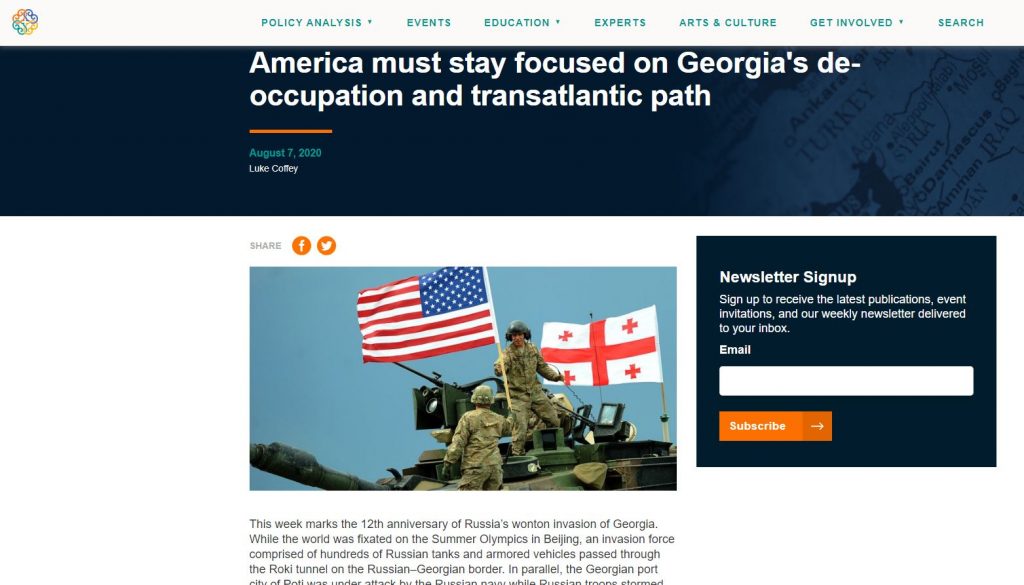Luke Coffey - America must stay focused on Georgia's de-occupation and transatlantic path
Luke Coffey, Director of the Allison Center for Foreign Policy Studies at The Heritage Foundation published a letter with the headline “America must stay focused on Georgia’s de-occupation and transatlantic path” on the 12th anniversary of Russia-Georgia war.
According to Coffey, 12 years after the war, thousands of Russian troops still occupy Abkhazia and the Tskhinvali regions, which together equal 20 percent of Georgia’s internationally recognized territory and Russia still violates Six Point Ceasefire Agreement.
Also, based on the letter, Russia also continues to use so-called hybrid tactics in Georgia. Since the 2008 war Russia has used propaganda, funded non-governmental organizations, and employed Russian-language TV channels to advance a pro-Russia/anti-West narrative in Georgia.
Coffey says that even with the Russian invasion and its aftermath, Georgia has not been deterred from getting closer to the West. Coffey names three reasons why the US should consider Georgia as an important ally:
“Firstly, Georgia is a proven and dependable U.S. ally in places like Iraq and Afghanistan. It is not well-known that at the time of the 2008 Russian invasion, Georgia had the second-largest number of troops in Iraq after the U.S. In 2012, when many NATO countries were rushing for the door in Afghanistan, Georgia added hundreds of troops to the mission there. At the height of the Georgian contribution to Afghanistan, it had more than 2,000 troops serving in some of the deadliest places in the country, if not the world, in the Helmand and Kandahar provinces. On a per capita basis Georgia has suffered the most killed in combat—even though it has only had a sizeable presence in the country for about half the time of the campaign. Today, Georgia has 870 troops in Afghanistan, making it the largest non-NATO troop contributor to the NATO training mission.
Secondly, Georgia’s strategic location makes it important for U.S. geopolitical objectives in the Eurasian region. Located in the South Caucasus, Georgia sits at a crucial geographical and cultural crossroads and has proven itself to be strategically important for military and economic reasons for centuries. Today, Georgia’s strategic location is just as important to the U.S. For example, Georgia offered its territory, infrastructure, and logistic capabilities for the transit of NATO forces and cargo for Afghanistan. Over the years, Georgia has modernized key airports and port facilities in the country. This is particularly important when it comes to the Black Sea region. Key pipelines like the Baku–Tbilisi–Ceyhan pipeline, the Baku–Supsa pipeline, and the Southern Gas Corridor transit Georgia as do important rail lines like the recently opened Baku-Tbilisi-Kars railway. The oil and gas pipelines are particularly important to Europe’s energy security, and therefore U.S. national interest in the region.
Finally, Georgia’s journey to democracy is an example for the region. Since regaining independence in 1991 after the collapse of the Soviet Union, Georgia has been on a journey to democracy,” Coffey claims.
Also Coffey underlines that U.S. must remain focused on deepening its bilateral relationship with Georgia and stand with Georgia firmly on its peaceful efforts of de-occupation and transatlantic path.
“Over the years, successive Georgian governments have pursued an agenda of liberalizing the economy, cutting bureaucracy, fighting corruption, and embracing democracy. Today, Georgia also represents the idea in Europe that each country has the sovereign ability to determine its own path and to decide with whom it has relations and how and by whom it is governed,” Coffey says.

